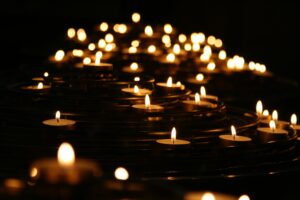Love in a time of virus: Grief

Photo by Mike Labrum on Unsplash
Dear ones,
I have started this letter to you over and over with the intention to reflect on loss – each time, tasting grief in my mouth and trying to discern which flavors to share with you. But as soon as I start to reflect on one face of the loss we are confronted with right now, another face bubbles into my mind’s eye and then I restart. This week, I read that as many people have died in the US from COVID-19 as died in 20 years of the Vietnam War. We have passed 1 million confirmed cases. These numbers are unreal and boggle my mind (although, admittedly in quarantine it seems my mind is easily boggled by all sorts of mundane things). I have given up mostly trying to keep up on the numbers. In the first days and weeks, I watched the numbers daily, new cases, new deaths. Now I find it’s too big. The numbers, the pain, the loss, looking down the road at the fallout, it’s all so much to take in. I still try to keep up with the latest, but sometimes I am numb to the magnitude. Other times, I just have to stop and cry. It’s the first person accounts I read that really break me down or fill me with fear or redouble my efforts at handwashing.
Recently, we were talking as a family about coping with sheltering at home, and my 15 year old daughter said dryly, “what about that day you sat on the couch and kept saying, does anything even matter anymore?” She is right. Most of the time, I am working, seeing lots of clients and supervisees, which keeps me grounded hour by hour in connection and focus. But I also have moments of despair when it’s all disorientation and limitation, when the restrictions or the enormity of it all overwhelms me and I feel oppressed and heavy. She is right that in those moments, I am asking myself does anything matter. This is me in my tipped over state. But in more balanced times, maybe the question needs to be, what matters? Can you feel for yourself the difference it makes when you know there is meaning in your own suffering? Something in me stands up under the weight of things when I know there is meaning. Maybe that is what has pushed me over the edge to write these letters to you.
Grief is as large and as complicated or simple or sharp as the loss you are grieving. Right now, grief seems to come in all shades, colors and textures. What is the texture of loss for you today? Is it sharp or dull? Is it heavy like a weighted blanket thrown over you or specific and targeted? My grief today is simple. I walk through the park, looking for my Cheep Cheeps (baby ducks), with my mask and grieve each smile I can’t see. My neighbors walk in the street to avoid being too close. The distance between us and the emptiness of my neighborhood street of shops is today’s grief. When we get to the other side, will we be afraid to be close? Will our kids feel that touch is dangerous? I am afraid that we lose humanity with each missed smile and touch. When I hear of people dying alone or birthing alone, I wonder, what will become of humans if we lose track of how desperately alone we are and how much we need each other? What lessons are our kids learning from this time about love, relationship, and themselves? Sometimes I remind my kids, who are teenagers, to keep their friends distant, but not with their hearts. (“I know, mom!” with rolling of eyes.)
I am taking refuge in my work right now. I know more than ever that I am lucky to have work at all right now, and the fact that the work feels meaningful is such a gift. It’s exhausting, meeting all day online, and right now no one is at their best, so it isn’t easy. I’m having to plan time to rest and time to pull weeds and get away from Zoom. But while I am working with people, I am deeply comforted and reassured by the hourly discovery of how human vulnerability is always there, underneath the wreckage of reactivity and patterns we get so caught in.
It has taken such a long time to learn how to find these places in people. I had to grow myself to be able to weather how people show up in distress. It is a process finding these deeper places. It is the aquifer of vulnerability and attachment that is the deepest part of our hearts. It isn’t always visible from the trail, you have to keep digging and to have faith that it is there. If you take a shovel or two and don’t see the glistening waters of belonging, keep going. It’s down there. But how would you know if you haven’t felt the waters of belonging flowing inside of you? Eventually, my couples say the same things over and over to each other, I need you, I don’t want to lose you, I am alone, I am afraid. These simple human truths feel like solid ground under my feet when seems everything is falling away. These things matter.
We are being required to distill our lives to the small and simple. To buy less, to do less, to see fewer people, to stop planning, to stop thinking we know what will happen. We are reduced to our simplest parts. Family, home, circle of meaningful people, neighborhood, street, enough food, enough home (if we are this lucky), enough. At the core of grief is love. Our grief reflects the meaning and importance of the loss itself. This is why we must grieve in the moments our hearts well with loss. We must let ourselves cry and look distractedly out the window and let the dishes go for the night. This is how we know what matters. Maybe the things we are grieving most acutely can be the light we follow as we all emerge from this darkness. Let’s whisper promises to ourselves about how we will re-enter and rebuild, following the light of grief and our hearts’ longings.
Stay close,
Sharon
 Previous Post
Previous Post